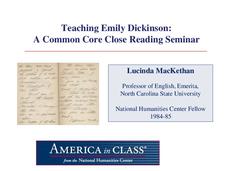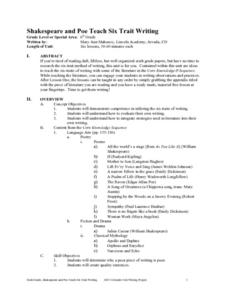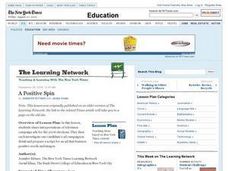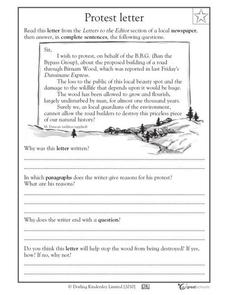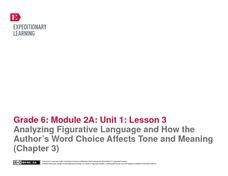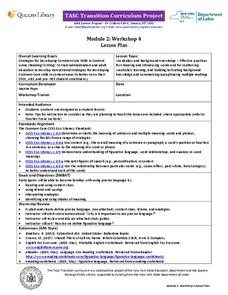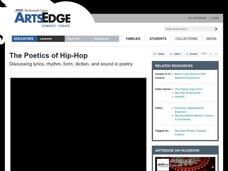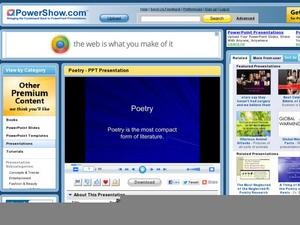National Humanities Center
Teaching Emily Dickinson: A Common Core Close Reading Seminar
Three of Emily Dickinson's poems, "I like to see it," "Because I could not stop for Death," and "We grow accustomed to the Dark," provide instructors with an opportunity to model for class members how to use close reading strategies to...
District 186 Springfield Public Schools
Tone, Mood, Theme, and Motif
It's all well and good when you're asked to identify a speaker's tone using his or her body language, facial expression, and pitch and emphasis. Identifying the tone of a written passage is another challenge entirely. Check out an...
Curated OER
Connotation: "My Papa's Waltz" by Theodore Roethke
What's happening in this poem? Have your high schoolers participate in an activity about connotation and denotation. They apply the concept of connotation to a reading of Theodore Roethke's poem "My Papa's Waltz." Lead a discussion about...
Curated OER
Old and Middle English
“The Lord’s Prayer” provides the text for a study of how language changes. Using the provided link, young linguists examine the prayer in Old and Middle English and compare how the diction, syntax, and phonology have evolved over the...
Curated OER
Singing for the Animals
Students examine the correct attitudes and poster for a concert. In this "Singing for Animals" lesson, students created charts to diagram information about the homeless animals they were singing for. Students used correct diction and...
Curated OER
Developing Your Writing Voice
Developing a distinctive voice is a challenge all writers face. Here’s a presentation that defines the parts of voice (attitude, syntax, diction) and then asks viewers to engage in a series of activities designed to model how to develop...
Curated OER
Press Review
How can word choice affect a political speech? Middle and high schoolers examine the text of the 1999 State of the Union Address, and then determine how newspaper articles and television reports describe and analyze the event. Use this...
Curated OER
The Tell-Tale Hearts of Writers
Knock, knock, knock...Creep out your class with a critical thinking lesson focused on word relationships in Edgar Allen Poe's "The Tell-Tale Heart." They investigate the relationship between word choice, mood, and interpretation of a...
Curated OER
Word Up!
Study the importance of word choice in informational text. Middle and high schoolers locate unfamiliar words and phrases in newspaper articles of their choosing, and use online word sites to explore the definitions and histories of each....
Curated OER
Remembrance of Things Past
Engage critical and social thinking by exploring the value of language and word choice. The class considers the article "The Silence of the Historic Present" and analyzes several presidential speeches. They engage in class discussion,...
Curated OER
Who Could Have Been Who
Can word choice affect a candidate's likeability? Use a New York Times lesson to explore how a presidential candidate's likeability factor can fluctuate in public opinion polls. Young readers choose a presidential election from their...
Curated OER
Shakespeare and Poe Teach Six-Trait Writing
A Six-Trait Writing instructional activity helps your middle schoolers liven up their word choice and shows them how to evaluate their own writing. Class members take a close look at the language used in poems by Shakespeare, Kipling,...
Curated OER
The "Write" Stuff: Strategies and Conventions for Imaginative Writing
A comprehensive and immersive series of lessons that examines various aspects of story development leads learners into writing a narrative of their own. Writers develop an understanding of the writing process as they use the learning...
Curated OER
A Positive Spin
Study word choice and connotation in advertising. Readers examine campaign ads, both negative and positive, from the 2006 mid-term election before discussing an article and analyze a campaign of any candidate they choose. Finally, they...
Curated OER
Borrowing Narrative Skills from Mr. Fletcher: Using a "Prompts in Reverse" Technique to Inspire Your Writers
Help your class find their writing voices with this lesson which uses the work of Ralph Fletcher to guide a "Prompt in Reverse" activity. Using the chapter "First Pen" from Fletcher's Marshfield Dreams, learners decipher what they...
Curated OER
Protest Letter
What a fantastic resource to guide youngsters in persuasive letter writing. They read a brief letter to the editor and answer question about the author's purpose, word choice, and structure. Next, scholars draft their own letter by...
EngageNY
Analyzing Figurative Language and How the Author’s Word Choice Affects Tone and Meaning (Chapter 3)
How figurative language affects the tone and meaning in Chapter Three of Christopher Paul Curtis' Bud, Not Buddy is the focus of a series of exercises that ask readers to locate, record, and analyze Curtis' word choices.
Star Wars in the Classroom
"Shakespeare and Star Wars": Lesson Plan Day 1
"Now is the summer of our happiness/Made winter by this sudden, fierce attack!" Luke Skywalker meets Hamlet in a 10-instructional activity unit based on Ian Doescher's William Shakespeare's Star Wars: Verily, a New Hope. Using Star Wars®...
New York State Education Department
TASC Transition Curriculum: Workshop 4
Why is it important to use precise language? Participants explore this question in the fourth activity in a series of 15 on effective instruction. Perfect for all content areas, the activity promotes appropriate language choice through...
K20 LEARN
Watch Your Tone: Tone Analysis Through Music And Nonfiction
Identifying the tone of a piece of writing or the author's attitude toward the subject matter can be difficult for learners. Simplify the process with a lesson that begins with skits, moves to songs and their lyrics, and then to passages...
Penguin Books
A Teacher's Guide to the Signet Classics Edition of Poems by Robert Frost A Boy’s Will and North of Boston
Here's a must-have guide for instructors who use Robert Frost's poems in their classes. The 24-page guide focuses on poems included in Frost's first two volumes of poems, background information on the poet, and what Frost thought was an...
Curated OER
Homonym Worksheet 2
In this grammar worksheet, students proofread a paragraph for diction problems and numerous homonym errors. Students underline each error and then write the correct form of the word right above the line.
Curated OER
The Poetics of Hip Hop
Students consider the role of rhythm, form, diction, and sound in poetry. For this integrated arts lesson, students discuss the attributes of poetry as they analyze Shakespearean sonnets, hip hop music lyrics, and poems by Nikki...
Curated OER
Poetry: The Most Compact Form of Literature
Introducing or need to review literary devices and terms for a study of poetry? Though text heavy, the explanations and examples of key poetic devices will provide learners with the vocabulary they need to discuss and craft poems.
Other popular searches
- Dictionary Skills
- Dictionaries
- Dictionary Skills Lesson
- Language Dictionaries
- Computer Dictionaries
- Biography Dictionaries
- Picture Dictionaries
- Acronym Dictionaries
- English Dictionary
- Dictionary and Thesaurus
- +Computer +Dictionary
- Dictionary Use


